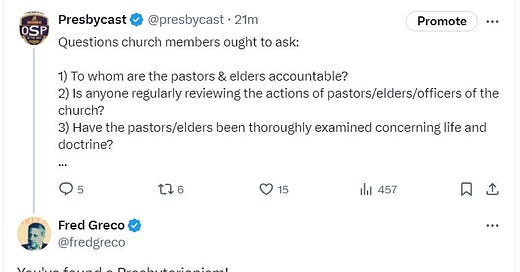11 Questions Prospective Church Members Ought to Ask
No polity guarantees good order & good outcomes, but some (being biblical) at least make these things possible.
To whom are the pastors and elders accountable?
Is anyone regularly reviewing the actions of pastors/elders/officers of the church?
Have the pastors and elders been thoroughly examined concerning life and doctrine?
Is there any court of appeal available to church members?
Are their historic creeds, confessions, and catechisms that define the doctrine of the church and allow evaluation of a given person or church's doctrinal faithfulness?
Is there a written church order document that governs the procedures of the church and defines the rights of members and processes for review and appeal?
Is church discipline exercised at all?
If so, is it conducted in a decent and orderly manner rather than an arbitrary manner?
Who owns and controls the church property?
Is there a policy on child protection and abuse prevention?
Are pastors and officers imposed on the congregation or chosen by the congregation?
In the last thirty years, many evangelical churches have discovered that the Bible demands a plurality of elders to lead the local church, but most have rejected or ignored the concomitant doctrines of church court accountability and connectionalism modeled in Acts 15.
Arguably, unaccountable elders may be worse than the old congregational-independent models.




Arguably, unaccountable elders may be worse than the old congregational-independent models.— or elders chosen to be “yes” men.
Do congregants have effective access to church courts in the PCA? Seems like anyone pursuing a cause through the church courts would be disciplined for disturbing the peace and purity of the church.